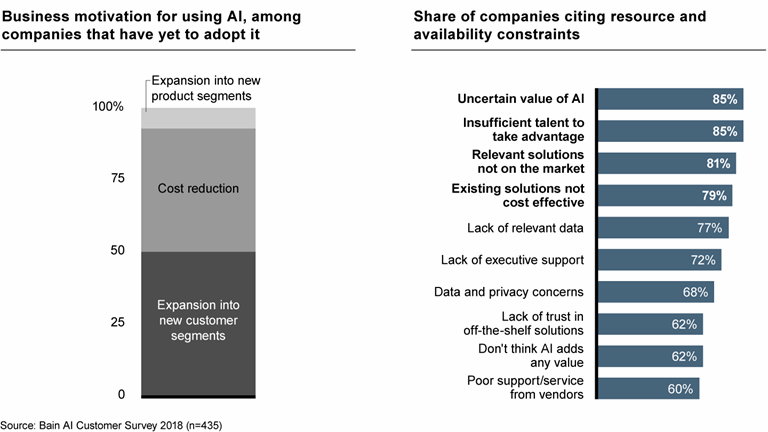
Table of Contents
Artificial Intelligence (or AI) has proven to be productive in a wide range of industries from marketing to healthcare. Now, more than ever, as economies are affected by COVID-19 lockdowns, businesses are trying to find ways to reduce costs and maximize investments. Many businesses are reviewing their existing investments in AI and machine learning—or considering new ones.
However, COVID-19 seems to be widening the gap between top performers and those that lag behind, and the companies that were investing in AI pre-COVID-19 are now doubling down on their investments, according to the 2020 McKinsey Global Survey. As businesses struggle to avoid being left behind in the wake of the pandemic, COVID-19 seems to be accelerating the need for AI adoption.
“We are likely to see a divide grow, with digital leaders better positioned to pivot and scale into new opportunities, leaving behind organizations that resist, or are unable to invest in their innovation journey.”
- Bev White, CEO, Harvey Nash Group, KPMG CIO Survey 2020
This article digs further into the reasons why COVID-19 may act as a catalyst for AI adoption, and what you as a strong leader can do to pivot your company and keep up with the AI curve through the pandemic and into the future.
At the end, I'll include some tips to accelerate your company's progress in incorporating AI and machine learning.
Article continues below
Want to learn more? Check out some of our courses:
How Covid-19 Accelerated AI Adoption
The RELX Emerging Tech Executive Report from 2020 revealed that 68% of respondents (1,000 US senior executives) increased their AI investments during COVID-19. As companies faced adapting to the pandemic to prevent being left behind, COVID-19 encouraged AI adoption as an option for a major competitive differentiator.
One example of this phenomenon is brand research. With social distancing guidelines in 2020, many brands were not able (and still aren’t able) to do traditional field research in order to understand their customers. But with the adoption of AI, companies can now use technology to understand the trends of their buyers.
While there is a clear need for the fast adoption of AI within business, still many tech buyers and sellers are unsatisfied with their progress after incorporating AI into their processes. Bain & Company conducted research in 2019 that found that 90% of tech executives consider AI and machine learning important, and that they should incorporate it into their products. However, 87% also said they were not content with their company’s AI approach. The RELX study also found that the leading reasons for companies to not adopt AI were constrained budget (44%) and lack of technical skills (39%).
Based on the research, frustrations with AI seem common. AI is complex to mobilize, and it can be challenging to make it do exactly what your company needs it to do. For example, as digitization accelerates, you store and generate more data than ever. With more data to use, AI tools will learn and get better. However, improvements in AI’s ability to learn will also need parallel progress in your ability to create complete and clean data sets.
In reality, AI will most likely take a long time to achieve its full potential in any given application. This learning curve discourages many executives who believe they don’t have the necessary talent to successfully implement AI into their businesses, leading them to reach out to third-party solutions.
Image Source: Bain & Co, www.bain.com
- Automation with Machine Learning: How to Use ML to Automate a Task
- Modern AI: Paradoxically Intelligent
What Do Successful Leaders Do in Front of Covid-19?
Businesses across the globe have been financially affected by the current pandemic, but the top performers are the ones that came up with innovative solutions, such as using AI as a tool in front of this challenge. COVID-19 is especially a test for leaders: successful leaders can make real changes in the way they integrate AI into their products, differentiating them from the competition based on AI-driven insights.
For example, in customer care, AI can be used to put together an agent that is able to speak to customers and help them with their issues. Each of the AI’s interactions would be based on its previous interactions and language abilities that were proven successful in determining a customer’s state of mind. Moreover, good leaders acknowledge the continuous process of successfully implementing AI. A successful AI integration includes putting in place the systems and processes for obtaining data and extracting the relevant insights to address current difficulties.
Top leaders take what they learn and scale it up, making machine learning an integral part of their solutions. Harvard Business Review describes a leader’s adaptive capabilities as “an almost magical ability to transcend adversity, with all its attendant stresses, and to emerge stronger than before.” While the COVID-19 pandemic will eventually pass one day, effective leadership should remain a priority of a successful company, despite the adversity.
What Good Leaders Ask Before Choosing AI
At this critical moment, we recommend business leaders to ask themselves the following questions:
- How is AI relevant to my industry and business now?
- What are our AI priorities?
- How can we adapt to changes?
- How can we demonstrate our growth to our stakeholders?
COVID-19 has brought about an AI boom, and it might be the perfect time to speed up your business' progress. Successful leaders realize that AI is a great tool but they’re also aware that AI represents consistent effort to reap its considerable rewards.




